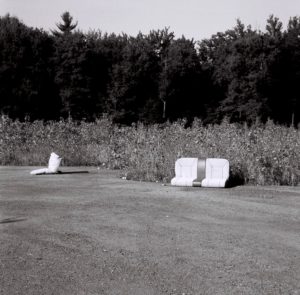Question: Welcome back. Shall we return first to the news and some more brilliant ideas circulating on the Internet? But later I would like also to ask you some personal questions, such as “are you a misanthrope? Are you happy?” Is that okay? Answer: It is okay. Thank you.
Question: So, let’s talk about social movements. Tell us, are the Proud Boys and other such groups patriots, or are they cases of arrested development? Answer: I am inclined to say that too often those are the same thing, but instead I will just say yes to the latter. Research has shown that members of such groups have trouble with complex problem-solving and have a strong preference for simplistic explanations of complex phenomena. [i]
Question: Since you are a person who has studied psychology, what developmental age would you say they are? Answer: Per Piaget, early “concrete operational” stage. Emotionally, per Erikson, I would say the stage of “industry vs. inferiority,” which places them at about the same developmental level both cognitively and emotionally: about eight years old. Their anthem that they sing for their mothers, Proud of Your Boy, from Aladdin, gives them away.
Question: Is it true that the Proud Boys were founded by a Canadian? Answer: Unfortunately, yes. A stain on the country. They were founded in Brooklyn by the scoundrel, who was supposedly educated at Carleton University, and who high-tailed it from Ottawa. Scottish parents, I understand, which makes it even uglier.
Question: Speaking of Canada, what about Prime Minister Trudeau? Answer: Decent guy. Has his mother’s heart, though he is not quite as smart as his father, who was, after all, a leading Quebec intellectual, which says a lot. Gets into hot water unnecessarily. Loved the famous hand-shake with Trump. Brilliant! I agreed with the 85-year-old woman in the seniors’ building I was living in at the time: I asked her how she liked him, and she replied, “Smokin’ hot!”
Question: If an election is called in the next months, given his minority government, will Trudeau win? Answer: Yes. He will win a minority government, and thereby Parliament and the country will be in precisely the same position as before the election. This is not uncommon in Canada and Israel. Both countries seem to enjoy having a lot of elections in which nothing changes.
Question: I have heard the term “proroguing Parliament,” and both Trudeau and the Conservative Prime Minister before him, Stephen Harper, did that. Proroguing sounds like something you would eat, possibly Polish, and perhaps on a stick. Would you explain what it means to the Americans in the group? Answer: Certainly. “Proroguing” is a mechanism with which you can send Members of Parliament home and start over when you don’t like how things are going, say, for example, when opposition members are closing in on a corrupt deal the government has made, etc. Then, when Parliament reconvenes, the game starts over with a clean slate. Of course, in our real lives, we are not allowed do this, but those clever politicians are smarter than us and so have availed themselves of the playground equivalent of a “do-over.”
Question: The Canadian Conservative Party rejected a resolution that would have recognized that climate change was real, and that we should do something about it. What will happen to them? Answer: They will go the way of the Dodo bird and the 50% of Republican men and certain health care workers who are refusing a Covid vaccine. It is Darwinian natural selection. Unfortunately, they may take the rest of us with them.
Question: But is climate change real and caused by human activity? Answer: Yes, along with accompanying weather extremes, species extinction and habitat collapse.
Question: Do we have the capability, with relatively straightforward and not unduly difficult fixes, to halt climate change and impending ecological disaster? Answer: Yes.
Question: Will addressing climate change harm the economy? Answer: No, it will help the economy. If we pursued it, it would be like the boom after WWII.
Question: Great! Given that, will we take necessary action on climate change soon enough to avoid devastating ecological collapse, with considerable human suffering and the decimation of other species? Answer: No.
Question: ??? But what about all that is happening right now? Biden’s plans, the fantastic drop in solar power costs and so on? Answer: It is great; what Uncle Joe is trying to do is terrific. But we are thirty-years-plus too late to avoid serious troubles. We are already experiencing some of them, in fact. The permafrost and glaciers are melting and already we have lost three billion birds in North America alone. We knew about this problem going into the eighties. The Kyoto protocol was, after all, was signed in 1992, and it has only gotten worse. Even now, I see a lot of unwillingness by people to change or to inconvenience themselves – things like horrendous cruise ships, gigantic suburban pickup trucks, all that flying around, bottled water, etc. So, no, we will not avoid suffering.
Question: Does that mean we should give up? Are you a pessimist? Answer: No. Of course not, to both. Remember Gramsci’s and Rolland’s dictate: “pessimism of the intellect and optimism of the will.” We can mitigate, and everything we do helps the planet and all sentient beings on it.
Question: Okay. A different subject: can established main-stream news providers be trusted? Answer: Yes: employing, of course, your faculty for critical thinking acquired in college.
Question: What about Fox News? Answer: No. Fox is not a news provider.
Question: Speaking of Fox News: do supply-side economic policies with big tax cuts, aka “trickle-down” (aka Reaganism or Thatcherism), work as claimed? Answer: No. Four decades of evidence show that its effect is the reverse: it is “trickle-up.” Or rather, wealth floods up to the already rich.
Question: Speaking of Thatcher, has Britain harmed itself by pursuing Brexit? Answer: Yes, substantially. Although I am sure it is not the case for those living through it, it has been a bit comical to watch from the outside. I suppose because it is self-inflicted. But I am sorry they have made such a colossal error and are making their citizens suffer. And it is most unfortunate that they are being “guided” through the process by a buffoon with weirdly tousled hair.
Question: Why, then, did they pursue it? Answer: Domestic chauvinism, fear of outsiders. But a correction: I’m not sure one can say “they,” speaking collectively of Great Britain. Wales tilted “yes” for obscure reasons including a large influx of conservative English in recent years. Scotland and Northern Ireland voted “no,” and it appears that a significant number of English “no” voters stayed home, considering the idea absurd, and so the true believers won. As one wag said, watching the English pursue Brexit was like seeing them gleefully sawing off both their legs. Sorry, I may have added the adverb, “gleefully.”
Question: Okay, a big one, as this continues to be contested hotly on the Internet: what about the Holocaust? Did Hitler really exterminate six million Jews? Answer: Most likely more than that if you include both the camps and the killings outside the camps – along with at least five million others outside of “regular” war casualties: Poles, Roma, gay people, the mentally ill, mentally retarded, and sundry other unfortunates. In addition to the millions killed in the concentration camps, there were untold numbers of Jews and others murdered in fields and towns of countries like The Ukraine. When there were children, the Nazis simply buried them alive, throwing them in with the bodies of their parents, to avoid “wasting” a bullet.
Question: Does this history bother you? Answer: Bother me? Bother me, you say? It stops me in my tracks. My mind freezes. It wakes me up at night. It makes me grind my teeth. It is horror, the stuff of nightmares, like the Japanese rape of Nanking,[ii] the genocide in Rwanda, the attempted genocide of the Indigenous People of the Americas, slavery, what neighbours did to each other in Somalia and the former Yugoslavia, ISIS beheaders and rapists, and dreadful Taliban women-stoners. It goes on and on.
Question: What can we do about it? Answer: Personally: what Buddhists call “lovingkindness,” or the Christian Golden Rule. Publicly: atonement and active reconciliation. Politically: the determination to prevent and stop occurrences at every opportunity, with force, as necessary and possible.
Question: Some people say that “history,” as we call it, is just a constructed narrative. Or as the Postmodernists claim, and all the students in the 90’s were indoctrinated to believe, that there is no truth, just “truth.” What do you think? Answer: Social and historical reality exist. Truth exists. Postmodernism is a catchy idea, but it goes too far. “Desconstruction” became a parlour trick. Derrida, the great showman that he was, overstated the case.[iii] To test this proposition, try standing in front of an oncoming locomotive.
Question: Does evil exist? Answer: ? You just asked me about the Holocaust.
Question: Does the Devil exist? Answer: Look in the mirror.
Question: Does Goodness exist? Answer: Of course. It is both all around us and inside us. The remarkable thing about goodness is you do not even have to exert yourself to get it. All you must do is open yourself to it.
Question: What is virtue? Answer: Consult Socrates.
Question: Can virtue be taught? Answer: Yes, according to Socrates.
Question: So, there is hope! What about love? Answer: It is the best thing we do, and the capability for love is the best quality we have.
Question: Now you sound like a Humanist. Are you? Answer: Yes, Enlightenment rationalism and humanism is one of the West’s greatest gifts, including liberating us from organized religion. Despite that, I know that there are larger and deeper aspects of existence that we cannot understand.
Question: Now you sound like a Mystic. Answer: I am all too aware that I am but a miniscule fragment of an incomprehensibly larger whole that is beyond my capacity to comprehend. And in the face of that, the best thing I can do is to experience great awe.
Question: Earlier, you sounded misanthropic. Are you? Answer: Misanthropic? No, I deny that. But I admit that each additional year that I continue to exist, my esteem for humanity lowers a few percentage points. It is now at 31.4%. But perhaps I have been watching too much television news. The past five years of American politics have taken a toll.
Of course, there are many one-hundred-percent people, although I sometimes have trouble recalling whom, other than dear friends and family. Well, no, I take that back: there are all sorts of ordinary, everyday hundred-percenters walking around – kind, generous, loving people, I see them in the grocery store.
And there are Greta Thunberg and Malala Yousafzai for sure. Uncle Joe Biden is certainly looking like a hundred-percenter. Historically, so many: Haydn no doubt. Dickens and Dostoevsky, of course. Voltaire, and Frida Kahlo. Nelson Mandala. Leonard Cohen and Joni Mitchell. Martin Luther King, Jr. All those great Canadian women, like Emily Carr, “Canada’s Van Gogh,” and the aboriginal poet Pauline Johnson (Tekahionwake), or the Inuit artist Kenojuak Ashevak, who was born in an igloo on Baffin Island. Then there was Viola Desmond, whose refusal to move from her seat in a movie theatre, in 1946, began to the end segregation in Nova Scotia. It took forever. The last segregated school in Nova Scotia shut its miserable doors in 1983! Don’t be smug, Ontarians, you had segregated schools from the late nineteenth century until 1965, when the last one closed in Colchester! Don’t get me started!!
Question: Okay, not a misanthrope, but touchy, if I might say so. So, given Covid and all the concerns you have mentioned, are you happy? Have you suffered with the pandemic? Answer: Let me start with the second one. No, I have not suffered with the pandemic.
I am a privileged person in all this. At most, I have merely been inconvenienced by having to stay home, not seeing family and friends, and not going to movies or out to hear live music. Mostly trivial disruptions. I have been helped by my essentially introverted nature.
I do miss those friends and family members very much and at times I feel sad about it. And I have had bouts of anxiety about when I will see my daughter and grandchildren again. I have gotten fatter, which bugs me. But unlike so many who have really suffered, I have lost no job, no business, nor income. I have not been sick, and most important, I have lost no loved ones. Instead, I have had a greater opportunity to be with myself, and have been able to make improvements, such as lowering my carbon footprint by not driving anywhere. I want to find ways to build on that.
Question: Okay. Then, happiness: are you happy and do you have a philosophy of happiness? Answer: Again, I will answer the second question first. I will have to start charging you double.
I understand that, contrary to the U.S. Constitution, happiness cannot be attained through pursuit. Nor is it “choice,” as new-agers claim. Try telling that to a Syrian refugee or a person suffering from major depression. You will risk a sock on the chin, and rightly so.
Rather, happiness is an understanding, a realization coupled with gratitude. For me, being unhappy would be a monumental act of selfishness. I am reminded of a saying, attributed to the Ojibwa, or properly, the Anishinaabe people: “Sometimes I go about in pity for myself, and all the while a great wind carries me across the sky.”
So yes, I am happy. I am a most fortunate person. Aside from being carried across the sky by a great wind, my gratitude list has become encyclopedic. Let me expound in detail. Despite all the usual human defeats and disappointments, I have made it to my overly-ripe mid-seventies, with no cancer, no heart attack or diabetes, and no Parkinson’s. So far, I have all my marbles. I am a citizen of not just one, but two of the West’s candy-store democracies. I am not, say, a Rohingya refugee living in shit-soaked squalor in Pakistan, a Uighur suffering “re-education” in despotic China, or a single mother trying to protect her children in gang-infested Honduras.
Instead, I live in freedom and tranquility in a little white house in Grandma Moses territory, the rolling countryside near Vermont’s Green Mountains, sharing life with a wonderful woman who loves me, all my alarming deficits included. I have a remarkable daughter and two stellar grandchildren, two terrific sisters and families, and good friends – and, as I said earlier, every one of these people so far has survived Covid.
All my life, I have been given unlimited opportunities to do meaningful work. And now, every month the American government, in its beneficence, deposits a nice sum of money into my chequing account. I never have to remind them. Mundane stuff really, but I have Beethoven on the radio, Stan Getz and Tim Hardin on the old iPod. Through the real miracle of the Internet, I can listen to my favorite radio station in the world, Jazz-FM from Toronto, any time I want, while remembering fondly when I lived there. I will never run out of books to read. For breakfast, I can sip fair-trade coffee, spread jam on my toast and devour an egg from free-range chickens. I can enjoy a modest cigar in the late afternoon and an Irish whiskey in the evening, while watching television in tranquility with my sweet partner. We have a 100-year-old rescue dog who does not bite, though God knows she would be entitled to, given her early history of abuse.[iv] We also share life with two foundling cats, one of whom thinks the dog is his mother, and the other who thinks he is part dog. Dudley walks around the yard with me when I do my daily inspection, and then when I go sit on the large stump to smoke my cigar, he jumps up and sits beside me, taking stock of things, as I do. Just that. It is amazing. So much to be grateful for.
I’ve got the sun in the morning and the moon at night.
But I do not live just for these “tranquil pleasures,” as Manuel Vilas said of his father. [v]
Instead, like most human beings, I know that there is a great light within me. And every day I grow one day closer to setting it free.
________________________________________________
[i] Grover, Natalie. People with Extremist Views Less Able to do Complex Mental Tasks, Research Suggests. The Guardian, February 21, 2021.
[ii] Chang, Iris. The Rape of Nanking. Basic Books, 1997.
[iii] Derrida, Jacques, Of Grammatology. Gayatri Chakravorty Spivak (transl.). Johns Hopkins University Press, 1976.
[iv] Dear Sandy died on Wednesday, April 21, 2021. I left this sentence written as is, in tribute. I continue to hear her patter in the house, and to look for her poking around in the yard, blind as she was, navigating by her sniffing, very fine doggish nose.
[v] Vilas, Manuel, op cit., page 179.



